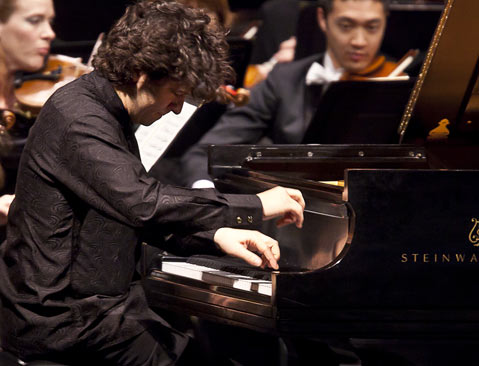SB Symphony With Sergio Tiempo, Piano
The Symphony Performed Works by Rimsky-Korsakov and Tchaikovsky

The collective contribution of Russian composers to the orchestral repertoire remains one of music’s most heroic episodes. From a variety of embattled positions within a society transformed by violent upheaval, Peter Ilyich Tchaikovsky and Nikolai Rimsky-Korsakov, to name just the two represented on this particular concert program, managed to revivify a European tradition that was already beginning to show signs of collapse in its nations of origin.
At the moment when French and German composers sought new challenges in chamber music and opera, the Russians took to the symphonic forms with the gusto of pioneers, claiming its most brilliant effects as their own and adding new life to the conventions of orchestration. Nowhere is the Russian musical renaissance more apparent than in the epic Symphonic Suite, Op. 35 of Rimsky-Korsakov, known as Scheherazade. Named after the narrator/protagonist of the Arabian Nights, the piece reenacts musically this compelling legend of the concubine who averted a death sentence by telling a seemingly endless series of stories to her captor the Sultan.
For Rimsky-Korsakov, who wrote the Scheherazade in a period of nationalist Orientalism, it represented the dialectic of freedom offered by orchestral composition within the strict conventions of the imperial Russian bureaucracy. Concertmaster Caroline Campbell was thrilling as Scheherazade, and the orchestra answered her with an equally electrifying rendition of the Sultan’s ominous sonic presence. Can it be mere coincidence that this suite, the best known work by the founder of Russia’s symphonic tradition, describes the desperate measures taken by the individual artist in the face of a totalitarian dictator’s death trap?
Sergio Tiempo has the athletic grace and sheer pianistic speed required by Tchaikovsky’s Piano Concerto No. 1 in B-flat Minor, Op. 23, and his performance with the Symphony on that piece made a very satisfying companion to the orchestra’s independent exploration of Scheherazade’s arabesques. Tchaikovsky’s Concerto No. 1 is one of the best known works in the repertoire. Its opening is unforgettable—even if the composer appears to have himself forgotten it by choosing not to repeat its theme in the rest of the work. In the movements that follow, Tchaikovsky yokes some impressively difficult passages for the soloist to a sequence of brilliantly developed themes that offer opportunities for the clarinet, flute, and oboe. Maestro Nir Kabaretti, resplendent in the shiniest tuxedo I’ve ever seen, did a fabulous job of keeping the whole thing moving along to a majestically fitting climax.



